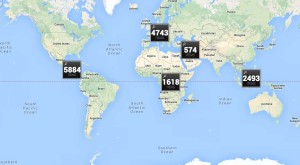By: Eion Oosterbaan
In May 2014, the United States Mission to the European Union in Brussels, Belgium hosted a strategy meeting focused on information-sharing regarding traveling sex offenders (TSOs), who play a large role in the ever-growing presence of International Sex Tourism and Human Trafficking. Eion Oosterbann attended as an observer on behalf of Shared Hope.
 In attendance were more than 70 people from over 15 countries representing government, law enforcement and non-governmental agencies. The purpose of this strategy meeting was to discuss the activities of the countries represented with respect to tracking the travel of TSOs from one country to another and notification of that travel to destination countries. It should be noted that it was accepted as a premise that the problem of TSOs is linked to the problem of human trafficking, particularly the trafficking and sexual abuse of children.
In attendance were more than 70 people from over 15 countries representing government, law enforcement and non-governmental agencies. The purpose of this strategy meeting was to discuss the activities of the countries represented with respect to tracking the travel of TSOs from one country to another and notification of that travel to destination countries. It should be noted that it was accepted as a premise that the problem of TSOs is linked to the problem of human trafficking, particularly the trafficking and sexual abuse of children.
It was clear at this meeting that U.S. law enforcement is tracking TSOs and providing notice to destination countries with a great deal of effectiveness (offenders against children). The U.S. is aided by its sex offender registration laws. The United Kingdom, Australia and Canada have similar laws and also address the problem effectively. Most other countries do not, but there seems to be broad interest amongst these countries in finding ways to provide and receive notice of TSOs. This universal determination is due to a recognition amongst governments that child sex offenders who travel to foreign countries pose a real risk to children in destination countries, particularly in destination countries with significant trafficking problems. However , the European Commission is not likely to enact legislation to register sex offenders due to privacy rights concerns. Without such legislation in countries, it would be difficult to track and provide notice of TSOs.
There are a number of legal and practical impediments to establishing a global notification system. The legal issues include privacy rights, which is a critical issue for certain European countries. The practical issues include problems of availability of data, lack of central control of data, reliability of data, and the timeliness of delivering of data and, accordingly, notice to destination countries.
By the end of the meeting it was clear that many gaps and needs must be resolved before a global notification structure and process for TSOs can be developed. Having discussed the diversity of conditions among the countries present, it was agreed that going forward the group’s strategy must be bifurcated to address countries that can and will monitor sex offenders on the one hand and those countries that cannot on the other. For the countries with privacy concerns standing in the way, arguments must be put forth that show the interests of protecting children outweigh privacy interests of offenders. Countries with an effective track record in registration and monitoring will help put forth these arguments with compelling examples and outcomes to be used by advocates in non-registration countries. For the countries already registering and/or monitoring, it was agreed that certain principles and objectives discussed at the meeting would be set out, drafted and shared by organizers with a view toward further discussion on specific steps and measures going forward. It is expected that this document will be shared shortly.
Due to Shared Hope International’s mission to prevent, restore, and bring justice in the effort to eradicate human trafficking worldwide, this issue lies directly within its realm. Looking at it from a macroeconomic perspective, Shared Hope has identified and targeted the demand for victims (buyers) as the entity that allows human trafficking/ sex tourism to exist and thrive. Simply put, without demand there would be no supply. Therefore, the establishment of a global notification structure for Traveling Sex Offenders would serve as a significant obstacle to the demand and source of revenue for human trafficking.






